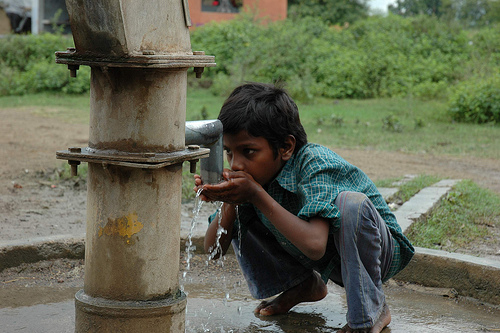/topics/international-issues
International Issues
The indigenous struggle- A look at three South American films on water rights
Posted on 31 Aug, 2010 02:51 PMThis past weekend was the only international film festival on water, worldwide—Voices from the Water, held in Bangalore in several different locations. Working for a water NGO, I made my schedule free to catch up on some of these movies, to understand what the current issues are and what the film circle is capturing through their lens that we don’t necessarily see from our biased eyes.
UN General Assembly s resolution on water and sanitation as a human right
Posted on 13 Aug, 2010 05:00 PMThe recent UN General Assembly Resolution on declaring water and sanitation as human right is or can be a powerful impetus to securing universal access to water and sanitation for people everywhere. This is the most recent in a string of initiatives to advance the provision of these essential services. Beginning with the UN Decade of Water in the eighties, then the declaration of the Millennium Development Goals, and later the adoption of General Statement 15 by the Economic and Social Council of the United Nations in 2002 the recognition of the fundamental importance of water (and more recently sanitation) to life, health and well being has been accepted at the international level. In India, while there is no specific mention of the right to water in the Constitution, the Supreme Court in its judgement(s)has upheld this as part of the right to life. Some organizations are working to make this a fundamental right, to remove any ambiguity.

Boy drinking water from handpump in Guna, Madhya Pradesh - Handpumps and wells are still one of the major source of drinking water in India.
Photo credits: Anil Gulati
Water challenges in Greater Bangalore - NIAS-CASUMM workshop note (2007)
Posted on 01 Aug, 2010 03:36 PMThis document provides the background for a workshop on 'Water Challenges in Greater Bangalore', organised by NIAS and CASSUM at the National Institute of Advanced Studies (NIAS), Indian Institute of Science (IISC) campus on March 27, 2007.
The document highlights the current scenario of privatisation of water services that are being funded by international financial institutions under the water sector reforms in the city of Bangalore, which have had a very negative impact on the urban poor, who continue to face the problem of inadequate, unreliable and unsafe water supply as compared to other posh and water rich areas in the city.
5th Global YES Summit, Rework The World - A trip report
Posted on 26 Jul, 2010 11:17 PMHad the opportunity to attend a recent worldwide gathering on the topic of youth and social entrepreneurship, which gave much food for thought. The event was the 5th Global YES Summit, entitled “ReWork The World”. Details of the gathering are at www.reworktheworld.org . The message there was that we need to do something radical in order to find productive work for the vast numbers of youth coming into the workforce especially in developing nations. The new jobs cannot be of the old variety, they need to be green, sustainable jobs. In other words, we need to ‘rework the world’. The conference was based on the premise that these new jobs will come out of social entrepreneurship.
Young Climate Savers programme:Teacher's manual on climate change and energy
Posted on 14 Oct, 2009 01:52 PMIn realizing this vision, WWF-India has partnered with Tetra Pak in designing the Young Climate Savers programme, aimed at imparting education on climate change in 200 schools across 10 cities in India through teacher training workshops and mainstreaming climate issues in the academic curriculum.
A round-off of the U.S. climate legislation-Clean Energy Jobs and American Power Act.
Posted on 07 Oct, 2009 12:07 AMAfter months of playing hide and go seek, the world's biggest polluter finally got working to shape up their act with the Clea
Remediation of arsenic for agriculture sustainability, food security and health in Bangladesh
Posted on 29 Aug, 2009 11:44 AMArsenic (As) in groundwater is a major health concern in Asia and the risks from using shallow tube wells (STWs) for drinking-water are well- known. At present, twelve countries in the Asian region have reported high As levels in part of their groundwater resources.
Intergovernmental Panel on Climate Change: Constituents, working groups and compilation of resources relating to the IPCC
Posted on 29 Aug, 2009 10:58 AMWhen climate change was first posited as "real" people all over the world realized that this issue encompasses the inter linkage of several other issues. The scope and magnitude of the consequences of climate change are also very far reaching.
The Subsidiary Body for Scientific and Technological Advice: A subsidiary body to the UNFCCC
Posted on 29 Aug, 2009 10:37 AMSome of the issues the SBSTA is currently dealing with are land use, land-use change and forestry, adaptation, mitigation, research, systematic observation and bunker fuels.
Extensive online resource base on the System of Rice Intensification: Homepage on the CIIFAD website
Posted on 29 Aug, 2009 10:31 AMThe site has sections detailing the methodology of SRI, its advantages, origins, current status in countries across the world, videos, articles, research papers, extension information, conference outputs, discussion communities, update series, newsletters and more.
See the homepage: Here





